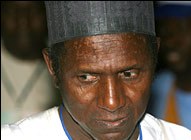 |
|---|
For President Umaru Yar’Adua the road to international acceptability is ever tough to travel. Emerging from a thoroughly flawed electoral process, doing business with him, at least for the United Nations, the government of the United States of America and other members of the G8 group of industrialized nations, associating with Yar’Adua is not going to be automatic. Conditions are being set for him. He has to get tough on the battle against corruption, ineptitude in high places and protectionism for indicted ex-governors.
There is no good news for members of the Nigeria’s ruling People’s Democratic Party, PDP from the recently concluded G8 summit. For a fact, none of those accused and found guilty of corruption would be presented as ministerial nominee or appointed into the news administration because western nations pointedly told President Yar’Adua that the agenda to put Africa on a strong economic footing is for real. The west is simply tired of being accused of conspiracy to deliberately under develop Africa. And central to the plan for springing a regional economic miracle for Africa is the natural and the enormous economic potential of Nigeria.
The UN at a plenary session on future economic development of Africa decided to drop the pretenses of diplomatese to drum in the terms for doing business with the new President of Nigeria. The Secretary General of the United Nations, Kim Moon, was said to have told President Yar’Adua that Nigeria should not keep any “sacred cow,” no cronyism.
Moon was said to have called for the prosecution of corrupt government functionaries instead being rewarded for the bad leadership conduct.
Pointblanknews.com was informed by a source who do not want to be named at the United Nation’s headquarters in New York that President Yar’Adua who had promised the U.N Secretary General of his commitment to an overhaul of the Nigeria’s electoral system, also gave a commitment that government officials who have been indicted by the EFCC or who are under investigation would not be part of his government.
“The Nigerian President did not only talk about his commitment to electoral reform with the Secretary General, he also promised to pursue transparency and ensure that only credible people are appointed. These are some of the concerns that were raised for his government to gain any acceptability.”
However, a source at the G8 forum told pointblanknews.com that “the sour fiasco called Presidential election in Nigeria could be overlooked but there would be no business as usual when it comes to the fundamentals of real national development, transparency and accountability in governance.”
advertisement |
|---|
President Yar’Adua is not well known internationally. Most journalist and world leaders who courted him at the G8 summit did so more out of curiosity rather than sovereign respect. Their had been an overkill of reports on the electoral fraud in Nigeria and his poise to continue business as usual by appointing discredited politicians into positions of public trust like ministers.
Pointblanknews.com also received copies of comprehensive memos written by some international personalities on the conditions that Nigeria has to be committed to for global political and economic connectivity. Former United States Ambassador to Nigeria, Thomas Pickering through his organization called International Crisis Group titled: Nigeria: Failed Elections, Failing State-Executive Summary and Recommendation. Also Assistant Secretary of State, Jendayi Frazer, did a similar memo titled: Nigeria at a Crossroads: Elections, Legitimacy and a Way Forward.
Ambassador Pickering had faulted the Nigerian electoral process first recommended a three month moratorium “on arrest by the economic and Financial Crimes commission to allow thorough review of its role in the April elections, clarify its functions and powers, and establish criteria for prosecution and an abuse oversight mechanism.”
The former U.S Ambassador to Nigeria urged the government of Yar’Adua to “dismiss the present leadership of INEC immediately in order to clear the way for a proper probe of its activities and defuse public outrage over its performance.”
The International Crisis group would want the U.S government to urge the Nigerian government to “publish the detailed, state-by-state breakdown of votes cast for each candidate at the presidential elections; publish detailed reports on the management of election funds, with special regard to compliance with due process and prudent practice in letting contracts.”
The group also urged President Bush to “encourage Nigerian authority to set clear benchmark for electoral reforms and a timeframe for implementation, by making them conditions for any assistance in future polls.”
Jenayi Frazer in a four point memo to President Bush recommended that for the U.S acceptance of the government of Yar’Adua, he must:
- Take further step to combat corruption, e.g. speedy signing of legislation on public procurement, fiscal transparency, and freedom of information;
- Adopt measures to enshrine transparency in national, state, and local government revenues and expenditures
- Establish more effective auditing, legislative, and judicial oversight of government activities; and
- Institutionalize and implement agreement on bilateral trade, investment, and standards issues to facilitate mutual economic growth.